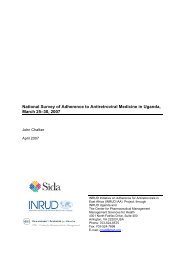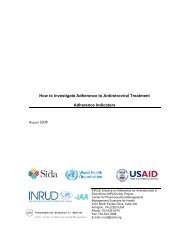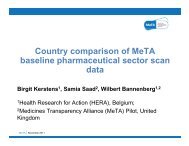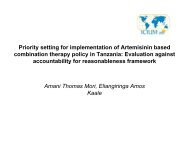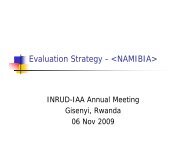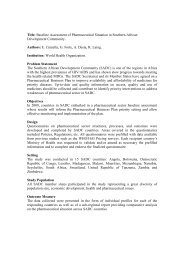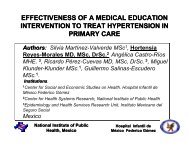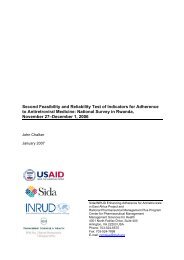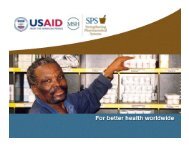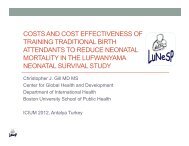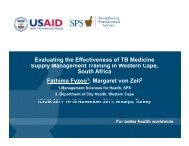How to investigate levels of Adherence to antiretroviral ... - INRUD
How to investigate levels of Adherence to antiretroviral ... - INRUD
How to investigate levels of Adherence to antiretroviral ... - INRUD
Create successful ePaper yourself
Turn your PDF publications into a flip-book with our unique Google optimized e-Paper software.
Chapter 6<br />
Planning and field methods<br />
Train personnel<br />
A key step in preparing for field work is <strong>to</strong> train the team leaders and data collec<strong>to</strong>rs <strong>to</strong><br />
collect and code the data in a correct and consistent way. Training is addressed in the next<br />
chapter.<br />
Pilot-test the data collection methods<br />
During the training <strong>of</strong> the team leaders’ and data collec<strong>to</strong>rs’ trainings, the data collection<br />
methods should be piloted at separate facilities <strong>to</strong> make sure the methods work and that<br />
they are unders<strong>to</strong>od. This is an important step which will provide an opportunity <strong>to</strong> identify<br />
and solve unforeseen problems. It will also identify "natural leaders" who can assist the<br />
other data collec<strong>to</strong>rs in case <strong>of</strong> difficulty.<br />
Experience shows that during the pilot testing the rate <strong>of</strong> data collection is always very slow.<br />
Data collec<strong>to</strong>rs should be reassured that with practice their rate will increase dramatically.<br />
So study planners should not make calculations <strong>of</strong> the time required at each site based on<br />
this exercise.<br />
Ethics for data collec<strong>to</strong>rs<br />
All data collec<strong>to</strong>rs should understand that any patient information they receive is<br />
completely confidential. They should not under any circumstances divulge any <strong>of</strong><br />
that information <strong>to</strong> anyone else outside the survey. Depending on where the<br />
survey is carried out, it may be necessary for the data collec<strong>to</strong>rs <strong>to</strong> sign a<br />
confidentiality agreement.<br />
It also needs <strong>to</strong> be unders<strong>to</strong>od that patients have no obligation <strong>to</strong> give exit interviews. Before<br />
the interview begins the interviewer should communicate the purpose <strong>of</strong> the interview and<br />
give an assurance <strong>of</strong> confidentiality. At that point, the patient needs <strong>to</strong> be asked for their<br />
consent <strong>to</strong> continue with the interview. If the patient agrees, only at that point should the<br />
interview begin.<br />
To select the sample <strong>of</strong> patients for the retrospective sample from the attendance register, the<br />
patient identifier form is used. For this only the patient identification number is recorded,<br />
not the name. This will enable the pharmacy records <strong>to</strong> be found in the most anonymous<br />
way possible.<br />
Collecting data<br />
Remember <strong>to</strong> arrive at the same time as the clinic opens <strong>to</strong> set up before the main rush <strong>of</strong> the<br />
day starts. After introducing the team members <strong>to</strong> the facility manager, the team needs <strong>to</strong><br />
quickly decide:<br />
<strong>How</strong> can they sample the retrospective records?<br />
Where they can sit <strong>to</strong> extract the data from the records?<br />
63



